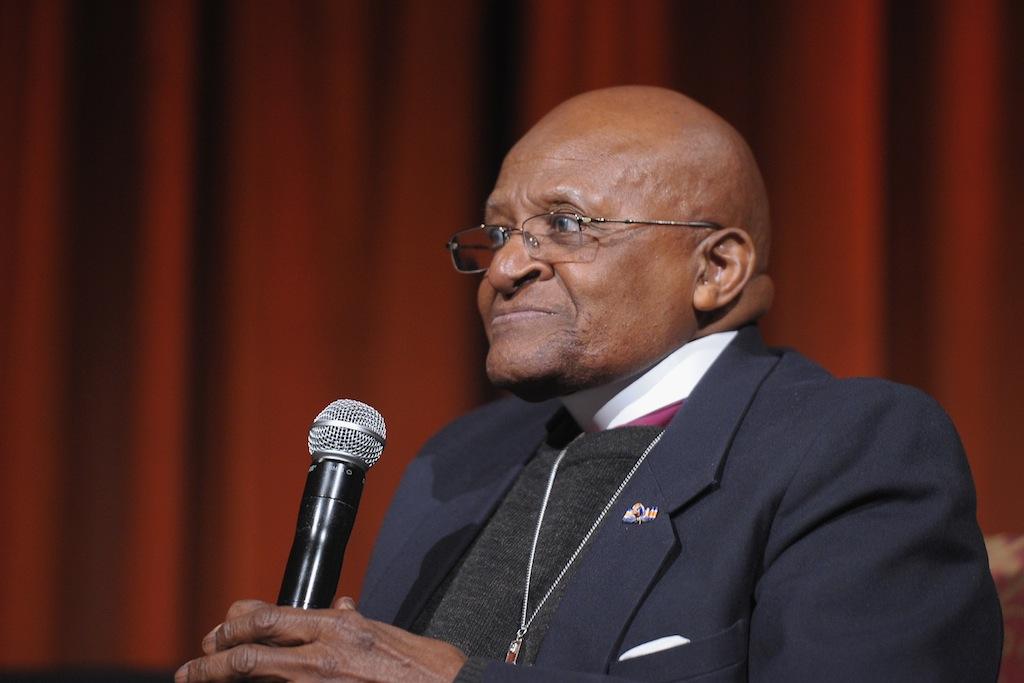Global pressure mounts against Ugandan ‘Kill the Gays’ bill
Archbishop Desmond Tutu, pictured here in October in New York, compared Uganda’s anti-homosexuality bill to apartheid and Nazi Germany in a letter on Wednesday.
Last we heard, the Ugandan parliament and the international press released conflicting reports about the inclusion of the death penalty in a bill about to be passed that would punish homosexuality in Uganda.
It seems the latest news is that the death penalty is indeed still included in the bill, and pressure is mounting from all sides sides of the globe, for Uganda to not pass the bill into law.
Archbishop Desmond Tutu today wrote an open letter to the Ugandan lawmakers, published in the Daily Monitor, likening the bill to apartheid and Nazi Germany:
"One thing that Ugandan legislators should know is that God does not discriminate among members of our family. God does not say black is better than white, or tall is better than short, or football players are better than basketball players, or Christians are better than Muslims… or gay is better than straight. No. God says love one another; love your neighbour. God is for freedom, equality and love.
People have over many centuries devised all kinds of terrible instruments to oppress other people. Usually, they have rationalised their awful actions on the basis of their belief in their own superiority, in their culture, in their spiritual beliefs, in their skin-colour. Thus, they argue, they are justified to hate and bomb and maim the “other”.
The Anti-Homosexuality legislation now under consideration in Uganda is just such an instrument.
Nelson Mandela said, “No one is born hating another person”. If people are taught and can learn to hate, they can learn to love…The depiction of members of the LGBTI community as crazed and depraved monsters threatening the welfare of children and families is simply untrue, and is reminiscent of what we experienced under apartheid and what the Jews experienced at the hands of the Nazis."
In Britain, the Home Office has suggested they might ban Ugandan politicians from visiting the UK, should the measure pass. PinkNews reports that MP Mike Freer, an openly gay member of the Conservative party, has applied pressure to the Home Office, asking them to take action.
The UK can ban individuals from the country if their exclusion is in the best interest of the public, and while it's not often that people are denied entry, it does happen. Home Office Minister Mark Harper has indicated that he would in fact consider banning Ugandan politicians.
“I am pleased the Home Office are prepared to take tough action against foreign politicians who oppress minorities and deny their citizens basic human rights," said Freer. "This is law is wrong, and we must do everything possible to stop its implementation.”
More from GlobalPost: Anonymous readies fresh attacks against Uganda over anti-homosexuality bill
Fellow GlobalPost blogger Jeb Boone has the latest on Anonymous' plan for a second round of attacks on Uganda, after the group defaced the Ugandan Prime Minister's website in August.
Now, the hackers say they will continue cyber attacks on a number of targets via #OpUganda, in classic Anonymous fashion – for the lulz.
“I am hoping that before New Year we will have another round of defacements and/or data releases,” said a member of Anonymous using the name sebastianowl, to GlobalPost.
The author of the bill, David Bahati, has said that the death penalty would likely not be included in the final version. However, as it stands, death is the punishment for the second offense of committing homosexual acts, engaging in sex with a minor or where one partner has HIV.
Speaker of the Parliament Rebecca Kadaga has said she would like to the see the bill passed by the end of the year as a "Christmas present" to Ugandans.
For more of GlobalPost's coverage of LGBT rights in Uganda, check out our Special Report "The Rainbow Struggle: A Global Battle for Gay Rights."
The story you just read is accessible and free to all because thousands of listeners and readers contribute to our nonprofit newsroom. We go deep to bring you the human-centered international reporting that you know you can trust. To do this work and to do it well, we rely on the support of our listeners. If you appreciated our coverage this year, if there was a story that made you pause or a song that moved you, would you consider making a gift to sustain our work through 2024 and beyond?
